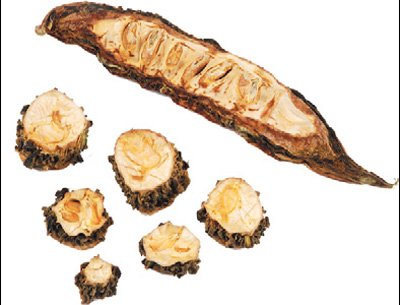Karavella
Ayurvedic Medicine

Karavella
Bitter gourd (E), Bitter melon (E), Karella (H):
Karavella is a common vegetable also used to regulate blood sugar levels and treat urinary disorders. It is a very bitter remedy that has a wonderful healing effect on the blood.
Diabetes Karavella has become renowned for its antidiabetic properties. Charantin is an effective hypoglycaemic and the polypeptide P lowers blood sugar levels more effectively than insulin without some of the side-effects. The bitter principle clears the kapha that is obstructing the pancreatic function in diabetes and stimulates medodhatvagni to metabolise fats and sugars efficiently. It reduces blood and urine sugar levels by reducing insulin resistance. Digestion It acts as an anthelmintic in the intestines. It has the added vermicidal effect of flushing bacterial and parasitic infections from the intestines as it mildly purges the bowel. It also reduces inflammation in the intestines. A special quality of karavella is that it does not aggravate vata, which is rare for a bitter substance. Urine Its effect on the water channels (ambuvahasrotas) helps to clear kapha from the system. It can be included in a formula for urinary stones as it has a direct effect on the urinary channel (mutravahasrotas). Skin Its alterative nature treats inflammatory skin conditions and benefits bhrajaka pitta. Having a thorough effect on the detoxifying capabilities of the whole system it regulates ran˜jaka pitta, clears bile from the liver, acid via the urine and toxaemia via the bowel. Blood It has an affinity for the blood. It is a traditional remedy for anaemia as it stimulates the tissue fires (dhatvagni) to work at optimum efficiency. It helps to build haemoglobin count by enhancing absorption.
 Kanchanara
Kanchanara Sarpagandha
Sarpagandha Lemongrass
Lemongrass Vidanga
Vidanga Punarnava
Punarnava Amalaki
Amalaki Fennel
Fennel Vamsa Lochana
Vamsa Lochana Psyllium
Psyllium Brahmi
Brahmi Fenugreek
Fenugreek Cardamom
Cardamom Test your English Language
Test your English Language  Precautions while using Social Networking Sites
Precautions while using Social Networking Sites Stress Management Tips
Stress Management Tips Know World Carnival
Know World Carnival Best Shopping Malls of India
Best Shopping Malls of India Movies for Valentines Day
Movies for Valentines Day Weird Fruit
Weird Fruit What to Eat in Tamil Nadu
What to Eat in Tamil Nadu Most Amazing Fountains Around The World
Most Amazing Fountains Around The World Most Amazing Roads
Most Amazing Roads Most Amazing Streets in the World
Most Amazing Streets in the World




